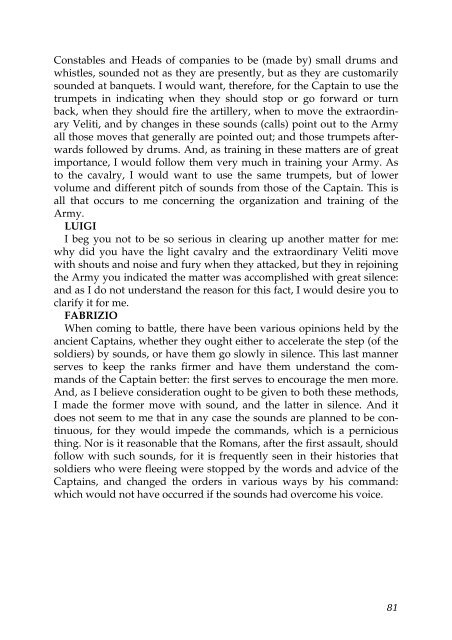Create successful ePaper yourself
Turn your PDF publications into a flip-book with our unique Google optimized e-Paper software.
Constables and Heads <strong>of</strong> companies to be (made by) small drums and<br />
whistles, sounded not as they are presently, but as they are customarily<br />
sounded at banquets. I would want, therefore, for the Captain to use the<br />
trumpets in indicating when they should stop or go forward or turn<br />
back, when they should fire the artillery, when to move the extraordinary<br />
Veliti, and by changes in these sounds (calls) point out to the Army<br />
all those moves that generally are pointed out; and those trumpets afterwards<br />
followed by drums. And, as training in these matters are <strong>of</strong> great<br />
importance, I would follow them very much in training your Army. As<br />
to the cavalry, I would want to use the same trumpets, but <strong>of</strong> lower<br />
volume and different pitch <strong>of</strong> sounds from those <strong>of</strong> the Captain. This is<br />
all that occurs to me concerning the organization and training <strong>of</strong> the<br />
Army.<br />
LUIGI<br />
I beg you not to be so serious in clearing up another matter for me:<br />
why did you have the light cavalry and the extraordinary Veliti move<br />
with shouts and noise and fury when they attacked, but they in rejoining<br />
the Army you indicated the matter was accomplished with great silence:<br />
and as I do not understand the reason for this fact, I would desire you to<br />
clarify it for me.<br />
FABRIZIO<br />
When coming to battle, there have been various opinions held by the<br />
ancient Captains, whether they ought either to accelerate the step (<strong>of</strong> the<br />
soldiers) by sounds, or have them go slowly in silence. This last manner<br />
serves to keep the ranks firmer and have them understand the commands<br />
<strong>of</strong> the Captain better: the first serves to encourage the men more.<br />
And, as I believe consideration ought to be given to both these methods,<br />
I made the former move with sound, and the latter in silence. And it<br />
does not seem to me that in any case the sounds are planned to be continuous,<br />
for they would impede the commands, which is a pernicious<br />
thing. Nor is it reasonable that the Romans, after the first assault, should<br />
follow with such sounds, for it is frequently seen in their histories that<br />
soldiers who were fleeing were stopped by the words and advice <strong>of</strong> the<br />
Captains, and changed the orders in various ways by his command:<br />
which would not have occurred if the sounds had overcome his voice.<br />
81
















